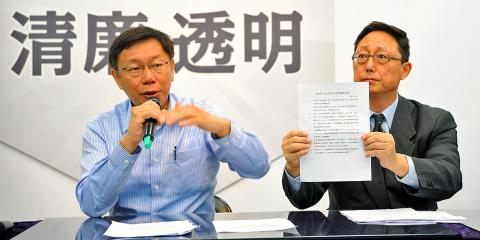Independent Taipei mayoral candidate Ko Wen-je (柯文哲) yesterday denied allegations that a US writer’s book claims that he purchased human organs from China for transplants.
Ethan Gutmann’s The Slaughter: Mass Killings, Organ Harvesting, and China’s Secret Solution to Its Dissident Problem, which was published in August, reportedly alleges that Ko, as director of National Taiwan University Hospital’s (NTUH) Department of Traumatology, bought organs from China prior to an interview Gutmann conducted with Ko in August 2007.
Gutmann reportedly wrote that Ko had considered purchasing organs from China due to the long wait — about two or three years — for people awaiting liver and kidney transplants in Taiwan, but that the doctor was worried that organs from Chinese death row inmates would be of poor quality due to disease or narcotics use.

Photo: Liu Hsin-de, Taipei Times
Gutmann reportedly claims that Ko reached an agreement with Chinese doctors to receive the organs of Falun Gong members, as most of them were young and healthier.
Ko’s campaign office issued a statement on Monday night denying the allegations.
The statement said that Ko agreed to be interviewed by Gutmann in 2007 to talk about the shady sources of Chinese human organs.
The office said that Ko has recordings of the interview that would prove the discrepancies between what Ko said and what Gutmann wrote.
Ko yesterday said that after overseeing post-transplant care at the hospital, he had not conducted transplants nor bought or sold human organs in China.
Gutmann contacted him because he was one of the designers of Taiwan’s organ transplant registry system, Ko said.
Ko said he told Gutmann that there were some doctors in Taiwan who had been involved in buying or selling organs for transplant, but that he was not one of them.
He never drank with Chinese officials or went to karaoke parlors with them as the book reportedly claims, the doctor said.
Taiwan lacked a systematic management plan for organ donations, which was why he spent two years helping establish a registry system and made it as transparent as possible, Ko said, adding that the system did not deter people from going to China for organ transplants.
Meanwhile, physician Huang Shi-wei (黃士維), who is deputy director of the Taiwan Association for International Care of Organ Transplants, and who helped set up the interview between Gutmann and Ko, was quoted by news Web site Newtalk as saying that he got in touch with Gutmann after local media reported on the book.
Gutmann, through an interpreter, told him that he had not said that Ko was involved in the organ trade and that he might have been misinterpreted, Huang said.
Huang also quoted Gutmann as saying that he has received notice from Ko’s lawyer about the alleged inaccuracies and that he would, through his lawyer, discuss with Ko how to correct the book.
Chinese Nationalist Party (KMT) Taipei mayoral candidate Sean Lien (連勝文) yesterday said that if the allegations were true, “it sounds like a very scary matter.”
Ko must address the allegations in full detail or risk his integrity being stained, Lien said.

US climber Alex Honnold is to attempt to scale Taipei 101 without a rope and harness in a live Netflix special on Jan. 24, the streaming platform announced on Wednesday. Accounting for the time difference, the two-hour broadcast of Honnold’s climb, called Skyscraper Live, is to air on Jan. 23 in the US, Netflix said in a statement. Honnold, 40, was the first person ever to free solo climb the 900m El Capitan rock formation in Yosemite National Park — a feat that was recorded and later made into the 2018 documentary film Free Solo. Netflix previewed Skyscraper Live in October, after videos

NUMBERS IMBALANCE: More than 4 million Taiwanese have visited China this year, while only about half a million Chinese have visited here Beijing has yet to respond to Taiwan’s requests for negotiation over matters related to the recovery of cross-strait tourism, the Tourism Administration said yesterday. Taiwan’s tourism authority issued the statement after Chinese-language daily the China Times reported yesterday that the government’s policy of banning group tours to China does not stop Taiwanese from visiting the country. As of October, more than 4.2 million had traveled to China this year, exceeding last year. Beijing estimated the number of Taiwanese tourists in China could reach 4.5 million this year. By contrast, only 500,000 Chinese tourists are expected in Taiwan, the report said. The report

Temperatures are forecast to drop steadily as a continental cold air mass moves across Taiwan, with some areas also likely to see heavy rainfall, the Central Weather Administration (CWA) said. From today through early tomorrow, a cold air mass would keep temperatures low across central and northern Taiwan, and the eastern half of Taiwan proper, with isolated brief showers forecast along Keelung’s north coast, Taipei and New Taipei City’s mountainous areas and eastern Taiwan, it said. Lows of 11°C to 15°C are forecast in central and northern Taiwan, Yilan County, and the outlying Kinmen and Lienchiang (Matsu) counties, and 14°C to 17°C

STEERING FAILURE: The first boat of its class is experiencing teething issues as it readies for acceptance by the navy, according to a recent story about rudder failure The Hai Kun (海鯤), the nation’s first locally built submarine, allegedly suffered a total failure of stern hydraulic systems during the second round of sea acceptance trials on June 26, and sailors were forced to manually operate the X-rudder to turn the submarine and return to port, news Web site Mirror Daily reported yesterday. The report said that tugboats following the Hai Kun assisted the submarine in avoiding collisions with other ships due to the X-rudder malfunctioning. At the time of the report, the submarine had completed its trials and was scheduled to begin diving and surfacing tests in shallow areas. The X-rudder,